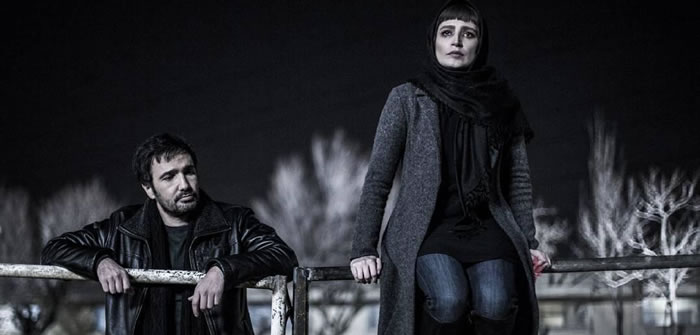This year marks the 25th anniversary of this festival, established by the Museum of Fine Arts, Houston, and Rice Cinema. Screenings take place at both venues and at Asia Society Texas Center. Following the 2017 presentation of Asghar Farhadi’s The Salesman, which went on to win the Academy Award for best foreign language film, this year’s selections include Breath, Iran’s submission for the 2018 awards. It is one of several narratives by and about young Iranian women, and, like Tehran Taboo, features the innovative use of animation. 24 Frames, the mesmerizing, experimental last film by the internationally celebrated Abbas Kiarostami (1940–2016) screens at both the Museum and Rice Cinema.
Festival ticket prices apply! General admission is $10. MFAH members, seniors (65+), and students with ID receive $2 discount.
• Film scholar Hamid Naficy, professor of radio-television-film and the Sheikh Hamad bin Khalifa al-Thani Professor in Communication at Northwestern University, gives a lecture at Rice Cinema on January 31. He was a member of the Rice University faculty when this festival was founded
Disappearance (Napadid shodan) Directed by Ali Asgari
Friday, January 26, 2018: 7 p.m.–8:30 p.m.
Over the course of one long night, teen couple Sara and Hamed visit a series of hospitals, terrified that their first romantic encounter may have dire consequences. However, none of the doctors will provide Sara the medical attention she needs without the presence of a parent. The couple’s desperation increases as they must hide what is happening from their parents—resulting in an expanding web of lies that changes their lives forever.
Praising the strong performances by the young lead actors, the Toronto International Film Festival observed that the film “shows us the complex reality of Iran’s strict cultural mores while casting a compassionate gaze upon the resilience of youth.”
Director’s Statement
In this film I am going to show the picture of a young generation, in a semi-traditional society, struggling to discover its identity. I like the audience to think about the lack of communication and effects of family limitations. Nowadays, the majority of the older generation in Iran likes to respect the traditions, while at the same time the majority of the younger generation is trying to overcome these same traditions, and the differences between these two points of view create a lot of conflicts and stories. These stories have always been important for me, especially because I experienced this kind of situations myself. I have tried to narrate them in my previous short films and some of the characters I created are still alive, and their stories are not yet finished in my mind. I would like to explore them some more.
24 Frames Directed by: Abbas Kiarostami
Saturday, January 27, 2018: 7 p.m.–9 p.m.
“Kiarostami represents the highest level of artistry in the cinema.” —Martin Scorsese
24 Frames is a contemplative photo-film essay started by filmmaker Abbas Kiarostami and, after his death in 2016, completed by his son Ahmad. The film comprises short vignettes based on photographs Abbas Kiarostami took over 40 years.
Upon the film’s premiere at Cannes, Barbara Scharres wrote on rogerebert.com: “These sequences are breathtaking in the beauty of the photography, and startling in the acuteness and vibrant curiosity of the vision. Each is a mini-drama evolving in its own time. Kiarostami’s love of snowy landscapes, the sea, the forces of nature, and his fascination with the unsentimental drama of the animal world bring home the intelligence and patient vision of the artist behind the camera.”
Houston’s Iranian Film Festival has shown many Kiarostami films, from the groundbreaking early feature Where Is the Friend’s Home? to international successes such as Through the Olive Trees, Taste of Cherry, The Wind Will Carry Us, and Certified Copy.
“24 Frames is an exquisite reverie on scenes from nature. Through still, but precise frames, and aided by subtle staging or effects, he captures the haunting, haiku-like poetry of nature, its beauty, amorousness and brutality. The play with the double meaning of ‘frame’ reflects his profound mediation on the cinematic form.” —Variety
“From my very first movie, what was my concentration, my inspiration, was that I didn’t want to narrate something. I didn’t want to tell a story. I wanted to show something; I wanted for them to make their own story from what they were seeing. My films have been progressing toward a certain kind of minimalism, even though it was never intended. Elements that can be eliminated have been eliminated. This was pointed out to me by somebody who referred to the paintings of Rembrandt and his use of light: some elements are highlighted while others are obscured or even pushed back into the dark. And it’s something that we do—we bring out elements that we want to emphasize. I’m not claiming or denying that I have done such a thing, but I do believe in Bresson’s method of creation through omission, not through addition. A work of art doesn’t exist outside the perception of the audience.” – Abbas Kiarostami
https://youtu.be/NBO0rqY4uQY
Negar Directed by Rambod Javan
Sunday, January 28, 2018: 5 p.m.–6:35 p.m.
This absorbing drama is a mystery-thriller with a touch of the supernatural. When her father’s death is ruled a suicide, Negar (Negar Javaherian) does not agree with the decision. Handsome Peyman, who worked for her father, tries to help Negar find peace of mind—but when Negar investigates on her own, she sees visions of what really happened. Father and daughter have discussions and relive family moments, and he provides her with clues in real time that steer her toward the truth. Negar discovers her father was in business with a ruthless criminal, and she vows revenge, but the new insights cause her to cast suspicion on everyone around her.
https://youtu.be/wwZLuTLBtvk

